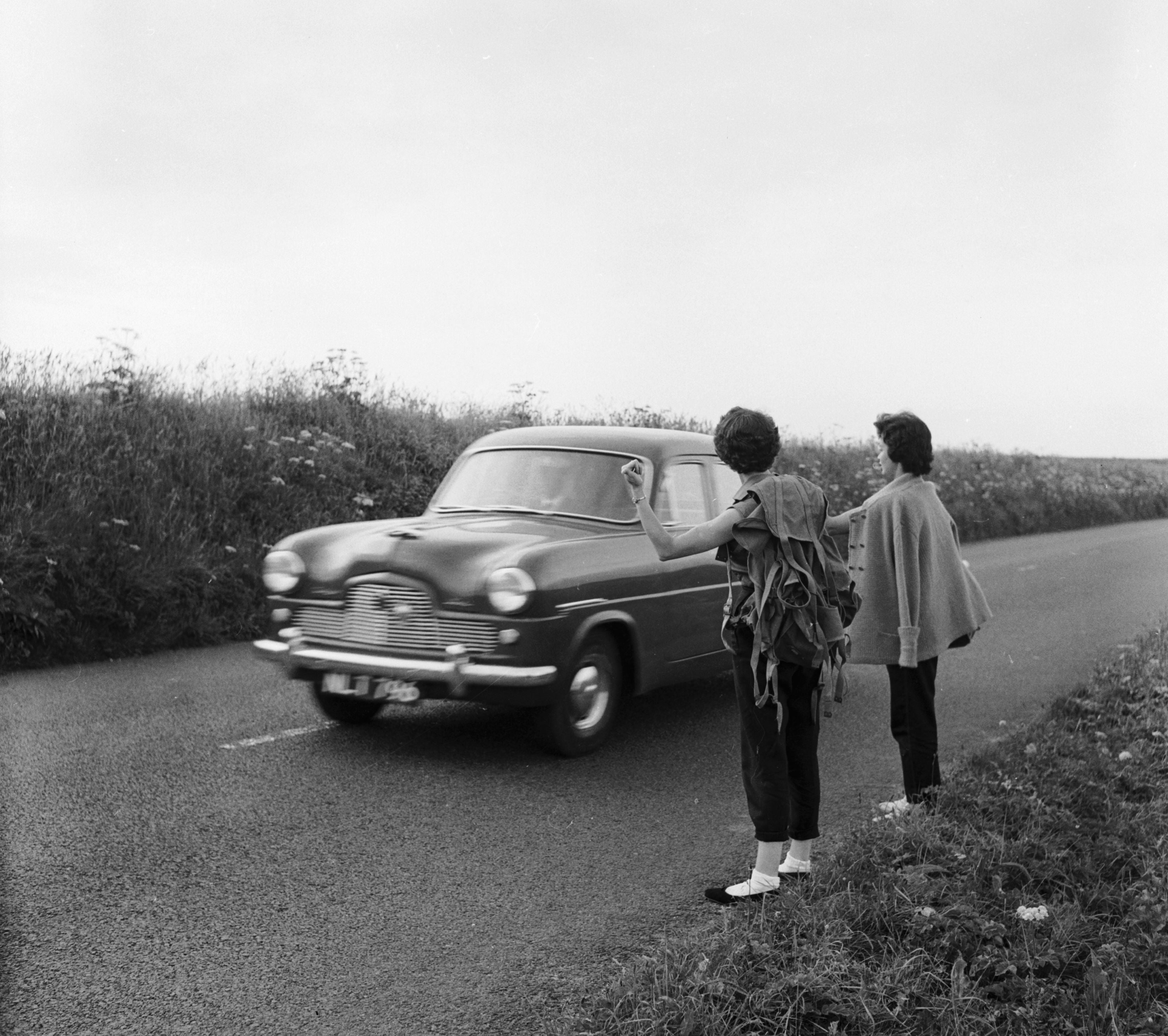As a fan of hitchhiking – could it help with the cost-of-travel crisis?
Often seen as a relic of a bygone era, Simon Calder explains why it could be a good way to combat rising costs – as long as technology can help mitigate some of the obvious criticisms


Smart motorways must be abolished. Doncaster Sheffield Airport must be saved for the nation. And we must build more roads. That is the sum total of what we know about Liz Truss’s plans for transport, as set out during the Conservative party hustings, prime minister’s questions and her first address to the nation outside Number 10. None of which, it seems to me, begins to address the current cost-of-travel crisis. Most longer journeys – and many shorter ones – in the UK are made by car. The vast majority use petrol or diesel – for which the price per litre has risen by 50 per cent in the course of a year.
On the railways, passengers continue to be deterred by a fares system of implausible complexity that all too often delivers outrageous prices. I could paper a room with the press releases I have received from the Department of Transport over the decades, promising reform of a system that everybody knows is broken. Yet no one has been bold enough to change it. With national rail strikes so frequent that they feel part of the rhythm of travel disruption, passengers are being actively discouraged.
Aviation, meanwhile, is in a holding pattern after the shambolic summer peak, waiting for the turbulence of high fuel prices plus the weak pound to strike as “hedges” unwind. Passengers must get used to higher fares and fewer flights.
Yet amid the transport doom, soaring inflation and economic misery, there is a dimension of mobility that could stage a welcome comeback: hitchhiking.
I can sense a rolling of eyes. Jack Kerouac drank himself to death in 1969. Surely the era of free and easy travel that the writer of On The Road came to personify died with him? An entire generation – probably two – can scarcely conceive of a time when any major motorway intersection or service station featured a straggle of young people soliciting lifts from passing drivers. In terms of unpredictability, hitchhiking ranks alongside angling – only with a huge potential downside, critics will argue.
Safety is the primary concern, and I shall propose some risk mitigation. But first, hear out the many benefits.

Of all forms of motorised transport, hitchhiking has the least impact on the environment. The hitcher is travelling with someone who is going anyway, adding only a minuscule amount to the fuel burn. Hitchhikers never need to be factored into forecasts for bus or train capacity, since their demand for transport is fulfilled by one of the extremely high number of empty seats travelling around the country.
The benefits go way beyond limiting damage to the planet. Hitchhiking can be an economic motor. You may regard that as a preposterous claim, as cash does not change hands – although it did on multiple occasions in On The Road. Yet thumbing a ride still allows some people in sparsely populated, bus-free locations to get to work and contribute to the economy. And hitchhikers are often tourists – spending money locally during their trips.
The greatest advantages of hitchhiking, though, are intangible. In my younger years, when public transport was based on fixed fares, way above my (non-) pay grade, I would have been effectively grounded without the opportunity to thumb lifts. Instead, I discovered a world beyond Crawley New Town that was full of wonders. That I remain an enthusiastic participant is partly because I have never owned a car, apart from a botched “buy-here-sell-there” attempt to make a journey from Adelaide to Sydney. “Big Red” as I named the clapped-out Holden, left me well in the red with a A$1,000 loss.
Hitchhiking still allows me to explore areas that would, as a non-car owner, be off-limits. Last summer I thumbed through the raw glory of Caithness; this summer I hitched along the north coast of Sicily. On both trips I met people who I would simply never encounter in other circumstances: a headteacher who lived and worked on the north coast of Scotland; an itinerant crew member from a Sicily-based superyacht; and an Algerian tourist who was exploring the biggest island in the Mediterranean using the sinuous old highways rather than the autopista.

As the kilometres clicked steadily away, we shared a journey through beautiful corners of Europe, shared conversation and shared humanity.
Yes, I have been blessed. In five decades of hitching, I have spent only one night in hospital as a consequence of a road accident while travelling in a lift. In the 20th century, the main risk of hitchhiking was all too evident: the death toll on the roads, particularly in Continental Europe, was tragically high. Thankfully accident rates have fallen sharply, and now the hitchhiking risk of most concern is harm caused by either party in the transaction.
The benevolent motorist who stops for a hitchhiking chooses, in a split second, to allow one or more strangers into the inner sanctum of their vehicle.
The hitchhiker is in a slightly better position to judge risk. I can evaluate a potentially dangerous driver if they swerve recklessly to a halt, and detect any smell of alcohol on their breath. But 999 times out of 1,000 I will accept the invitation and get in.

Most other people, particularly women on their own, would – understandably – simply never wish to put themselves in such a position. Some of my female friends who still hitchhike use technology to try to limit the danger they place themselves in. They note or photograph the number plate as they approach the vehicle. Once inside and on the move, they politely say to the driver: “I hope you understand, I’m just going to text your registration number to my friend.” Most drivers understand and are impressed with this simple safety precaution rather than indignant at its application.
Here’s a challenge for a tech start-up: harness mobile connectivity to emulate hitchhiking, but giving the participants some prior reassurance about each other – and ideally remove the standing-forlornly-in-the-rain element in the process, if you would.
Attempts to organise hitchhiking have never worked in the UK. In Germany, MiFaZ calls itself an online brokerage for ride-sharing, while BlahBlahCar does much the same in France. The idea is that the passenger pays the driver something for the fuel, and the “marriage bureau” that connects them collects a small fee. The organisations deploy an array of safety measures to try to ensure the participants are benign. Yet despite multiple attempts to use these services I have never succeeded in finding a ride. Paris to Berlin in three days’ time is not much use when you need to get to the German capital today.
We need Uber-like technology to accelerate the market, to give it the immediacy that hitchhiking involves. I dream of a time when I can be in a stranger’s car heading south on the A9 from far north of Scotland, tapping at my phone to set up an onward ride from Inverness to Skye. But for now, I will hop out of one lift, thank the driver for their generosity (and hope that they feel good about helping a stranger), then take up a suitably visible location beside the A82 and hope for the best. Transportation salvation usually arrives, sometimes quite quickly. I have not the slightest idea who I might be about to meet. But I am sure I am going to like them.




Join our commenting forum
Join thought-provoking conversations, follow other Independent readers and see their replies
Comments